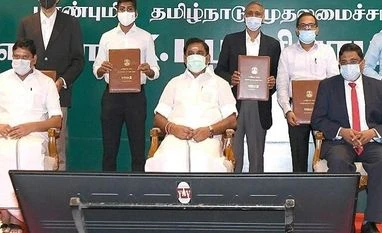Industry’s preference for Tamil Nadu has not diminished despite the pandemic.
The state signed 80 deals worth Rs 66,000 crore in 2020. These investments are expected to create nearly 121,000 jobs. Since 2015, the government has signed MoUs (memoranda of standing) worth Rs 5.5 trillion and the most recent ones are with Ola, defence major The Crown, Tata Group’s Voltas, and 14 other companies which have signed MoUs to invest Rs 19,995 crore last week. But the big question is: Will these MoUs turn into investment?
The administration and experts agree that not all will come into effect immediately. It would take a couple of months or even years, and some of them may not take off due to various factors including technology changes, the companies’ financial situation, the impact of the pandemic, etc.
However, the Tamil Nadu government’s success rate (percentage of MoUs materialising) has been good despite all the macro challenges.
“We are committed to the growth and development of the state. We have pursued investment to fuel growth and that is why Tamil Nadu has managed to attract the highest investment, among the Indian states, so far in this financial year,” said Chief Minister K Palaniswami, who gave an updated scorecard on the MoUs signed in the past five years.
He highlighted the fact that the state had managed to grab 16 per cent of the funds that came to the country during the first half of FY21, and was ranked at the top by CARE Ratings.
According to him, during the Global Investors Meet (GIM) in 2015, the government signed 98 MoUs worth Rs 2.42 trillion with a promise of 470,065 jobs. In five years, 72 per cent of these have started and attracted around Rs 73,711 crore, creating 186,838 jobs. The rest are a work in progress.
During the 2019 GIM, the state signed 304 MoUs worth Rs 3.005 trillion, which would create 1.050 million jobs. Around 27 per cent of the projects have started and another 191 are in progress.
So what makes Tamil Nadu continue to attract investors? Bhavish Aggarwal, chairman and group CEO, Ola, said: “A manufacturing unit in Tamil Nadu is an ideal choice for us owing to the strategic location, a conducive business environment, a favourable ecosystem, and a high level of skill sets in the state”. Last week his company signed an MoU with Tamil Nadu on investing around Rs 2,400 crore to set up the world’s largest scooter-manufacturing plant.
R Ganapathi, past president of the Southern India Chamber of Commerce and Industry and now executive member of the Federation of Indian Chambers of Commerce and Industry, said there was a long interval between MoU and production.
According to him the factors helping the state include talent, competitive labour, and labour productivity. Besides, power, infrastructure, connectivity, recent reforms, and consistent marketing are positive.
Vishal Yadav, CEO and founder of consultancy firm FDI India (founded in 2015), which helps Indian businesses connect with foreign investors, said the state’s commitment to economic development, guidance on ease of doing business, and effective bureaucracy had helped it to draw a wide range of investors.
A senior government official said in the past four-five years, the state undertook reforms which were attracting investors, starting with revamping Guidance, an investment promotion agency of the government and a statutory body to facilitate single-window clearances for business enterprises. The portal has received 169 applications, of which 105 were approved, and cumulative investments were worth Rs 35,083 crore with the potential to create 122,893 jobs.
The government has constituted a 16-member Special Investment Promotion Task Force, headed by the chief secretary, to attract companies that are diversifying their investments globally.
Tamil Nadu also established a high-powered special committee under C Rangarajan, former governor of the Reserve Bank of India, for the economic revival of the state. The panel is advising on the short- and medium-term responses to mitigate the economic impact of the pandemic.
Some companies have pointed out the major challenges in Tamil Nadu are land acquisition and social infrastructure.
Commenting on land acquisition, government officials in the industry department have said state agencies including Tamil
Nadu Industrial Development Corporation and State Industries Promotion Corporation of Tamil Nadu (SIPCOT) are creating land banks. With the new Land Acquisition Act of 2015, it is difficult and expensive to acquire land. The state is looking at alternative modes of acquiring land through private negotiations or promoting joint-venture parks where the private player has land.
The state is also trying to motivate them to put the land to industrial use and is supporting private industrial parks by facilitating and incentivising them. Palaniswami recently inaugurated the GIS web portal of SIPCOT.
Unlock 30+ premium stories daily hand-picked by our editors, across devices on browser and app.
Pick your 5 favourite companies, get a daily email with all news updates on them.
Full access to our intuitive epaper - clip, save, share articles from any device; newspaper archives from 2006.
Preferential invites to Business Standard events.
Curated newsletters on markets, personal finance, policy & politics, start-ups, technology, and more.
)